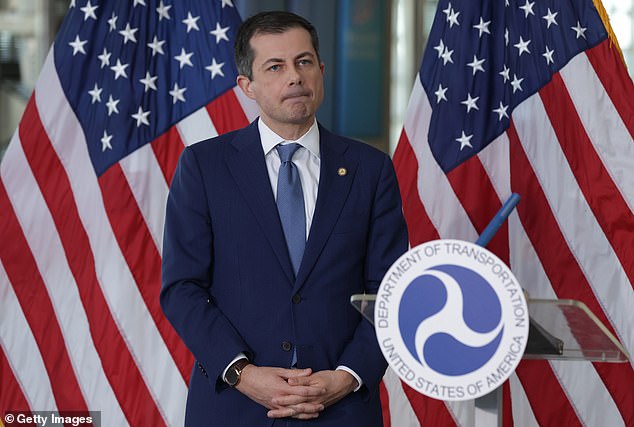Transportation Secretary Pete Buttigieg has feuded with Elon Musk and Donald Trump Jr. about the Biden administration’s expensive electric vehicle program.
President-elect Donald Trump is under pressure to reverse Biden’s “radical” electric vehicle (EV) policies within his first 100 days back in the White House.
The Biden administration issued one of the most important climate regulations in the country’s history in 2022.
It is designed to ensure that the majority of new passenger cars and trucks sold in the United States are fully electric or hybrid by 2032.
The Department of Transportation, under Buttigieg, launched the National Electric Vehicle Infrastructure (NEVI) Program to build EV charging stations across the country by 2021.
Buttigieg, Don Jr. and Musk fell out over the program after the president-elect’s son commented on the Transportation Secretary’s legacy.
“It doesn’t seem like a great return on investment… but hey, he checked a wake box, so it’s definitely worth it,” Don Jr. said. while sharing another tweet claiming that $7.5 billion had been spent on just eight charging stations.
Buttigieg responded, “The tweet you quoted is false.”
Pete Buttigieg is feuding with Elon Musk and Donald Trump Jr. about the Biden administration’s expensive electric vehicle program


Buttigieg, Don Jr. and Musk fell out over the program after the president-elect’s son commented on the transportation secretary’s legacy
That’s when Musk interjected, “Well, please post the rebuttal.” Then Community Notes takes care of the rest.”
“For starters, $7.5 billion hasn’t been spent or anything like that. That is the entire program budget for the NEVI program, which should contribute to the development of a national charging network by 2030,” Buttigieg said.
“Second, there are now chargers operational in nine states (which doesn’t mean there are 9 chargers, just to be clear). However, these are just the first handful. Most will be built in the second half of the decade.
“Third, in this program the chargers are built by the states, not the federal government. And while it will take time to get a new multi-billion dollar program up and running in fifty states, the states are on track.”
NEVI’s total budget is $7.5 billion, of which $5 billion has been allocated to the construction of charging stations on highways across the country and $2.5 billion in subsidies, according to PlugInAmerica.
As of October, 20 NEVI-funded chargers are operational in nine states, including Hawaii, Kentucky, Maine, New York, Ohio, Pennsylvania, Rhode Island, Utah and Vermont. Atlas EV Hub.
The Biden administration’s EV invasion in 2035 could create a roadblock in the already stressed U.S. power grid, experts warn.
That’s because the U.S. electric grid hasn’t been updated in more than 25 years, and there’s a need for more transmission lines to power millions of new green-energy vehicles — all of which could cost more than $2.5 trillion.
The Department of Transportation, led by Buttigieg, launched the National Electric Vehicle Infrastructure (NEVI) Program to build EV charging stations nationwide by 2021
Musk interjected with, “Well, please post the rebuttal. Then Community Notes will take care of the rest’
Energy demand will account for about a third of electricity growth over the next ten years. Princeton University projected that the country will use 3,360 percent more electricity to meet the president’s goal.
“According to our forecasts, electric vehicles will cause electricity demand in the transport sector to grow between fivefold and tenfold by 2035,” an EIA spokesperson told DailyMail.com.
There were about 2.4 million registered electric vehicles in the U.S. at the end of last year, which isn’t yet enough to overwhelm the electric grid but could cause major problems in the future if the infrastructure isn’t updated, experts warn.
The International Energy Agency’s Global EV Outlook predicted that electric vehicle sales could reach 17 million by 2024 and predicts that electric vehicles will likely account for half of all cars sold by 2035.
IEEE Spectrum, a publication of the Institute of Electrical and Electronics Engineers, published a report on the EV transition and published a study in 2023 showing that 8,000 power generation units and 600,000 circuit miles of AC transmission lines will need to be replaced or upgraded by 2035.
In addition to 70,000 substations to support more renewable energy and battery storage, bringing the cost to more than $2.5 trillion.

